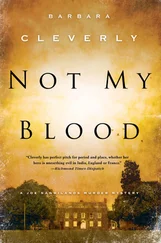Barbara Cleverly - The Palace Tiger
Здесь есть возможность читать онлайн «Barbara Cleverly - The Palace Tiger» весь текст электронной книги совершенно бесплатно (целиком полную версию без сокращений). В некоторых случаях можно слушать аудио, скачать через торрент в формате fb2 и присутствует краткое содержание. Год выпуска: 0101, ISBN: 0101, Издательство: Constable & Robinson, Жанр: Исторический детектив, на английском языке. Описание произведения, (предисловие) а так же отзывы посетителей доступны на портале библиотеки ЛибКат.
- Название:The Palace Tiger
- Автор:
- Издательство:Constable & Robinson
- Жанр:
- Год:0101
- ISBN:9781780337685
- Рейтинг книги:4 / 5. Голосов: 1
-
Избранное:Добавить в избранное
- Отзывы:
-
Ваша оценка:
- 80
- 1
- 2
- 3
- 4
- 5
The Palace Tiger: краткое содержание, описание и аннотация
Предлагаем к чтению аннотацию, описание, краткое содержание или предисловие (зависит от того, что написал сам автор книги «The Palace Tiger»). Если вы не нашли необходимую информацию о книге — напишите в комментариях, мы постараемся отыскать её.
The Palace Tiger — читать онлайн бесплатно полную книгу (весь текст) целиком
Ниже представлен текст книги, разбитый по страницам. Система сохранения места последней прочитанной страницы, позволяет с удобством читать онлайн бесплатно книгу «The Palace Tiger», без необходимости каждый раз заново искать на чём Вы остановились. Поставьте закладку, и сможете в любой момент перейти на страницу, на которой закончили чтение.
Интервал:
Закладка:
‘Here — what do you make of this?’ Joe asked, his attention caught by a linear pattern of red handprints running along the bottom of the wall. ‘It doesn’t seem to chime with the rest of the decoration?’
‘Thapas,’ said Stuart. ‘No, a false note if ever there was one.’ He shuffled his foot uncomfortably on the sandy road. ‘It’s symbolic of the practice of sati. All the widows of the head of the house used to go to the pyre with their dead lord. And his concubines as well. Most went willingly — it was a matter of pride and honour and an outward show of the love they bore for him. But I suppose you know all this? On their way to the fire they dip their right hand into red ochre and leave a print on the wall of the house.’
Joe looked in distress at the line of prints, some no more than child-sized, and stammered, ‘But there must be. .?’
‘Never tried to count them. They go all the way around.’
Joe looked more closely. The line of prints was fading progressively as it stretched away but the last two or three seemed to him suspiciously fresh. He shared his suspicions with Stuart.
‘It goes on,’ said Stuart wearily. ‘The British outlawed it a hundred years ago but you can’t be everywhere. The last of these prints was put there three years ago, I’m told. But come on, let’s go in, shall we? This is the headman’s house. The house where Udai was born. They’ll be expecting us.’
‘Amal khaya, sahib?’
‘What’s he saying?’ asked Joe.
‘He’s asking if you’ve had your opium today. He’ll provide if you haven’t had time for it yet this morning,’ said Stuart.
Joe managed to find the right words in Hindi to say thank you but refuse the traditional stimulant. His host, Shardul Singh, waved away the hookah, smiled and asked for tea and pastries to be brought instead. They were seated barefoot and cross-legged on white cotton-covered mattresses laid on the cool marble floor of a verandah overlooking a courtyard filled with flowers and fruit trees. Joe wondered briefly how many buckets of water had to be carried here each day to maintain this profusion. Shardul was simply dressed in white dhoti and kurta with a yellow turban and surrounded by similarly attired smiling men ranging from very old to young. One of the younger ones was brought forward with the explanation that his English was much better than Stuart’s Hindi and with great good humour the audience got under way.
The polite compliments flowed from both sides and it was some time before Stuart judged the moment right to introduce his business. Delicately he asked if he might speak with the chief ’s kinsman, Ali.
The enquiry was greeted with what Joe’s keen eye took to be genuine puzzlement. Heads were shaken, consultations took place and questions were asked. The conclusion was that Stuart must have been misinformed about the movements of his rigger. Ali had not returned to his home since he had left it over a year ago to work for Stuart at the palace. The men appeared politely concerned but not alarmed by the alleged disappearance of their kinsman. They were in fact more intrigued by Joe’s presence than by Ali’s absence and, it seemed to him, were impatiently waiting for some explanation of his arrival amongst them.
Stuart filled in the details of Joe’s visit to Ranipur, rather overdoing his importance, Joe thought. Friend of the Viceroy? Celebrated tiger hunter? Polo player extraordinaire? He hoped he would not be expected to demonstrate any of these alleged attributes. And now Stuart was telling them that Joe was also a scholar — a great Brahmin in his own land. He was involved in research for a study of the Shekhavati region. They had all heard of Colonel Tod who a hundred years earlier had written a history of Rajputana? Well, Joe was continuing the Colonel’s good work. Would they mind if he asked them a few questions on life amongst the Rajputs?
They didn’t mind. They were intrigued. They were voluble in their answers. Joe took out his Scotland Yard notebook and wrote down answers to questions Stuart told him he was asking. He even interposed a few of his own, and so entertained was he by the narrative energy and the delight the men took in their folk stories and the history of their tribe that he was almost caught out when Stuart slipped into the conversation a question about the Ranipur succession. He knew Joe would be very interested to hear the story of the accession of Udai Singh.
A favourite story, obviously, as everyone was eager to offer his own version or correct someone else’s. From the torrent of Hindi and English Joe teased out an intriguing tale. Udai, far from being a modest village boy, was the younger son of a well-to-do merchant but not of the royal blood. At his birth nearly half a century ago when the customary horoscope was prepared and read out, his family were stunned to hear that the baby would one day be ruler. The men remembered and recited the horoscope word for word and Stuart translated. ‘“The boy will one day be maharaja and the father of a maharaja who will see a new sun rise over Ranipur.”’
And all had gone as forecast. The old ruler had been childless and, with advancing age, and no doubt aware of the prophecy, had adopted the young Udai, taken him and his older brother to Ranipur and trained them both in the skills required to rule a kingdom. Udai had been a good ruler, they added, and had looked with favour on his native village, doing whatever he could to alleviate the tragedies that the years had brought.
Joe felt his new role of historian called on him to enquire further about the tragedies. Again the response was almost overwhelming. The seven-year drought at the turn of the century, the present drought which threatened to be just as catastrophic, the war in Europe which had killed so many of the young men who had gone off with the Ranipur Lancers, the influenza which had decimated the population, the failing of the trade routes, the unending taxes imposed by the British and the migration of the young to the cities. . The list was long and full of pain.
As he listened with half an ear to the heartfelt, keening liturgy of loss and devastation, a terrible thought came to Joe. A thought so terrible his mind recoiled from it and he thrust it away. It returned with double force and he knew suddenly why his instinct had led him to Surigargh.
Chapter Fourteen
In the durbar hall Udai Singh heard the Jenny fly overhead and dismissed the remaining supplicants. He sent away his servants and called his brother to his side.
‘Our guests are returning, Zalim.’
‘As you suspected, Highness, they went off in the direction of Surigargh. The Englishman has a reputation for finding out the truth and a reputation for honesty. Edgar says he is all he appears to be and serves no one but the British Empire. He is Sir George’s eyes and ears, they say.’
‘But the brain, Zalim, that’s what interests me. Has he got the brain to get to the heart of our problem? We must encourage our enterprising detective. If he has been sent to observe, let him observe. Make certain that the telephone line is put always at his disposal — he will need to report back to his master. The man has standing amongst his own people, I observe, and his presence here has already made them more circumspect and calmer. . like a herd when the shepherd returns. He has no more power than they themselves have but he carries an aura, an illusion of strength which they appear to find comforting. I should like him to stay on for a while. In the days to come there may be a danger for my son, and Bahadur tells me he likes and trusts this man. So be it. Let the policeman be an unofficial bodyguard for the child. Offer him distractions. . Though not women if the reports are to be believed!’
Читать дальшеИнтервал:
Закладка:
Похожие книги на «The Palace Tiger»
Представляем Вашему вниманию похожие книги на «The Palace Tiger» списком для выбора. Мы отобрали схожую по названию и смыслу литературу в надежде предоставить читателям больше вариантов отыскать новые, интересные, ещё непрочитанные произведения.
Обсуждение, отзывы о книге «The Palace Tiger» и просто собственные мнения читателей. Оставьте ваши комментарии, напишите, что Вы думаете о произведении, его смысле или главных героях. Укажите что конкретно понравилось, а что нет, и почему Вы так считаете.












